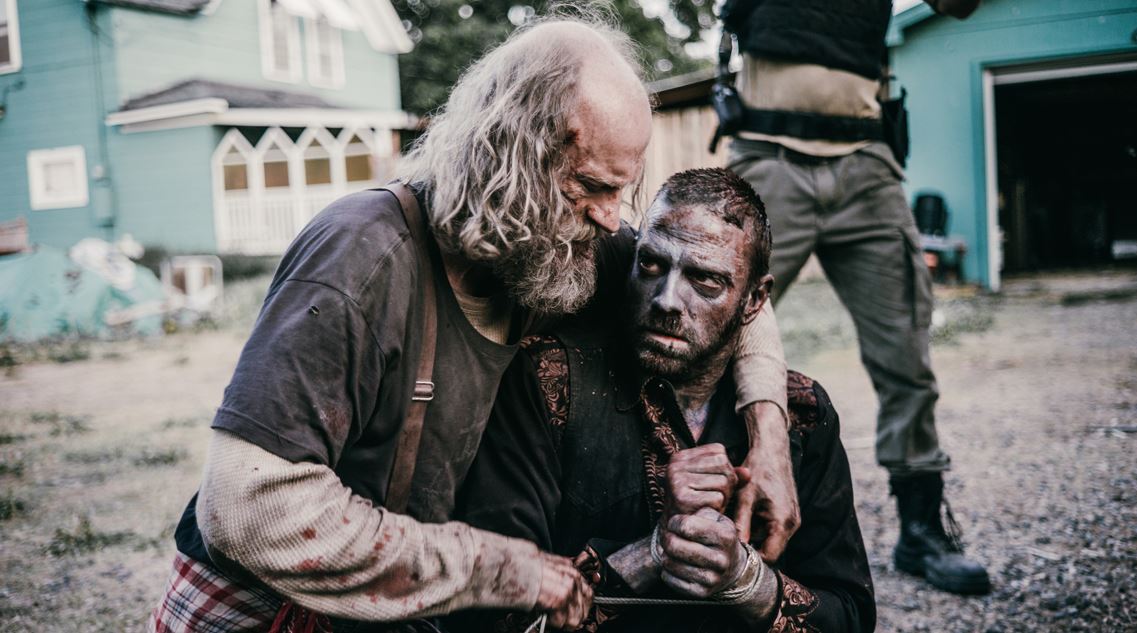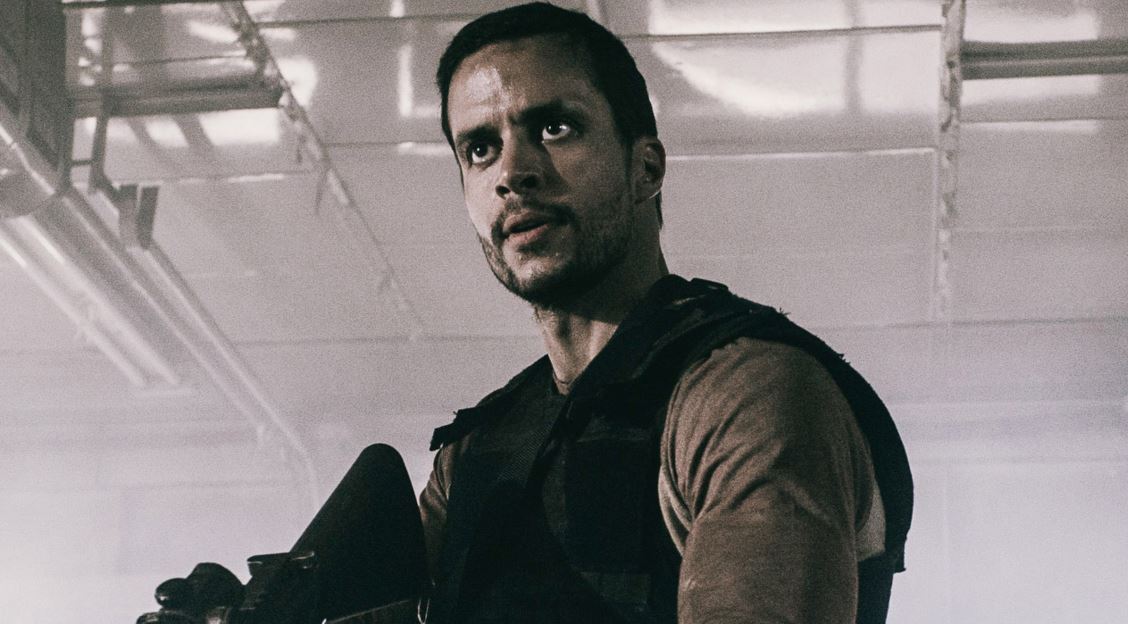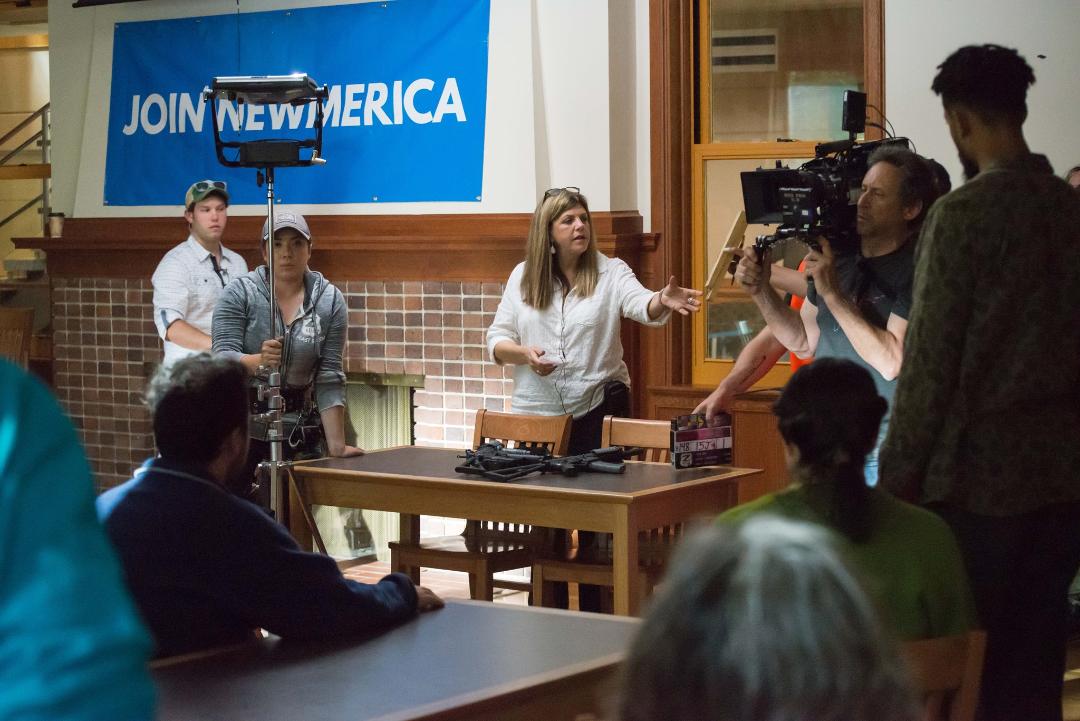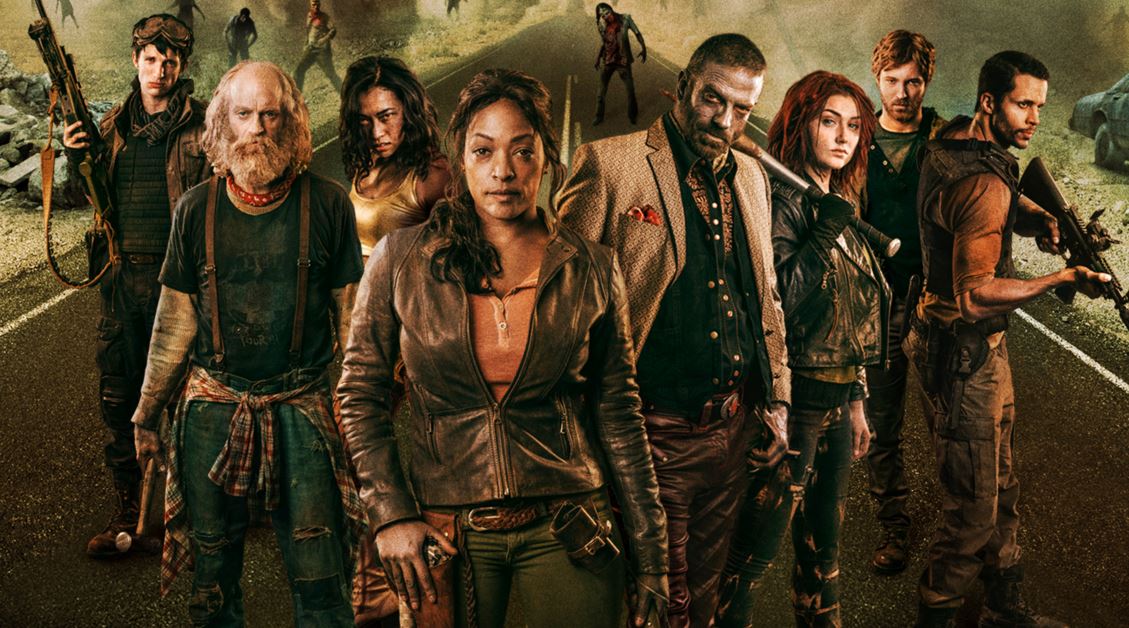The career of producer, director, and writer (the resume goes on) Jodi Binstock leans somewhat towards TV comedy. That isn’t a criticism by any means. It is just an observation that gets increasingly interesting, as you look more closely at the films and shows she has worked on, over the course of a career that began with several episodes of Boy Meets World in 1999. Arguably, her two most successful shows as an executive producer (sometimes writing, sometimes directing) is the hilarious Lisa “Only Tolerable Friends Cast Member” Kudrow comedy about a therapist who rolls out a new, “faster” form of therapy. The series originally appeared online, but it would eventually go on to run on Showtime for an impressive four seasons. Web Therapy is a fantastic showcase for Kudrow, and it is a surprisingly sympathetic look at the idea that our healers are probably looking for a way out, too.
Then you have Z Nation, which is getting ready to debut its fifth season. What started out as another high-stakes-tension-and-dark-comedy zombie series has gone on to become a character study every bit as engaging and compelling as any other zombie-themed TV show currently on the air. The fifth season promises to be the best one yet, and the show has only seemingly gotten better at blending action, comedy, and the general malaise you can feel when the entire world has come to an end. It is far and away one of Syfy’s better offerings.
There is no question that Binstock has helped shape these shows, as well as her other projects, to a meaningful degree. If there is a consistent thread in much of her work, it would be that she seemingly likes to work with stories that love difficult characters in even grimmer situations. She will be up to that sort of thing again with the upcoming Z Nation spinoff Black Summer, which will appear on Netflix in the near future. That’s going to star the versatile, underrated Jaime King. On top of all of this, Binstock recently directed the film I’ll Be Watching, a thriller which has earned good reviews from everyone who has seen it.
It isn’t surprising that Binstock can bounce easily between film and television. What is perhaps surprising, or perhaps just a shame, is that she is only in recent years begun to receive the attention and credit her creativity and work ethic deserves. As the push for greater diversity behind/in front of the camera strengthens, women like Jodi Binstock are ready to tell the plethora of interesting stories that they have been working on. She herself is eager to create more opportunities for women and others to build their experience, learn the business, and perhaps tell stories of their own.
Let’s start off with a big congratulations for Z Nation entering its fifth season! As one of the executive producers and directors, what has become the biggest challenge with the series after five seasons?
We’re very happy about that! Five seasons. We’re the little engine that could on SyFy. The biggest challenge for the show after five seasons was from the fact that the show is set four years after the beginning of the apocalypse. So the first mission was to get Murphy to the CDC. Each subsequent season has been to get him through different goals. Last year, the way season 4 ended, you had this group of billionaires on an island called Zona, deciding to basically extinguish all of humanity and start over again, with the 1% guiding the world. Warren finds out about it at the end of the season, and we think that she is basically going to be the one causing the annihilation. You’ll have to tune into season 5 to see what happens!
The tricky part has been keeping the interest for our fans and the audience base. Knowing that killing zombies is sort of old hat by now, and keeping the zombies and storylines interesting in a genre that’s very saturated in the marketplace.
That was actually one of the things I liked about the show when I started watching it. We didn’t have to go through the zombie apocalypse, which I feel like I’ve seen a few hundred times at this point.
Yeah, absolutely. One of the most unique things about the show is that it’s unique in the marketplace of both sci-fi and zombie shows. The lead character is an African-American female, and the show was always conceived that way. Not that there was a male she would fall behind. She was always intended to be the star of the show. That is very unique, and I think our fanbase has fallen in love with Warren, and what a badass she is. Not because she’s African-American. She just happens to be African-American, which is also a really wonderful thing in today’s world.
Well, it’s a testament to horror as a genre, because horror has always been a little more progressive than a lot of other stuff. It just takes everyone else longer to catch up.
Yeah. That has been one of the challenges as a female director for myself. Being able to direct in genre stuff like sci-fi, or just action material in general, is something that has always gone to the males for the first choice. I think that female directors, especially in the last couple years, are really showing what they can do with things like Wonder Woman. Our show has at least two female directors per season, since the second season. The first season, I think, was all male. But since season two, we’ve had at least two women write and direct episodes of the show. We’re pushing that glass ceiling a little further each year.
I remember the show getting mixed reviews with the early episodes from season 1. Obviously, that perception has changed a great deal, and the show has long since found an audience. Do you think the series just needed a moment to find its legs? I’m certainly glad Z Nation had the chance to do that in the first place.
Our show is very unique. It’s not produced by Syfy, but by The Asylum. It was licensed by Syfy. That came with its benefits and detractions. The benefit was that we didn’t have as many people scrutinizing us as another show. It was extremely cheap for Syfy. They just paid a licensing fee, and they got a show for it. The show remarkably did better than almost everything on the network that year. That was a shock to everyone. That was sort of a unique benefit. We got to stay under the radar enough to not have the scrutiny of a typical network show, where you have so many people with their hands in the pie.
Absolutely.
I think that really helped, because the showrunner Karl Schaefer was able to create what he wanted. One of the ways he was able to achieve that is because this is an extraordinarily low budget show, probably lower budget than most shows you’ve ever heard of. One of the ways he was able to achieve that was by giving opportunities to writers and directors to have an auteur investment in both the scripts and episodes. We’re all filmmakers.
Everybody wanted to give it their best. As we were writers, we were also producers, and we were also directors. Everybody had an investment in it and didn’t want it to fail. I think that is one of the most unique aspects of our show. You don’t see that in a bigger budget show, or even in a bigger budget sci-fi show. I think there’s a lot more people with their hands in it with higher budget shows.
So we achieved the unachievable, and they just sort of left us alone. Now, the hard part about that is that in season 5, people are tired. They’re tired of doing low-budget shows on that kind of a budget year after year. It’s a grind. We do an episode in five days.

Five days? My goodness!
That’s unheard of. People are tired, and that’s one of the challenges we face. You look for season 5 to be a little bit easier, but it’s actually a little bit harder. You just don’t get the assistance. But nobody’s complaining! Everyone’s happy to have the work, and to be doing good work.
I do like the low budget energy of the show, but I don’t think it looks or feels cheaply made.
Thank you.
Horror lends itself well to low budgets. The best low budget is often stuff that appreciates characterization, atmosphere, and humor above all else. All of those qualities are very much present in Z Nation. I do think it’s unfortunate. The perception is that with a show entering its fifth season, you can look forward to things like a little more money, or—
We actually got less money.
Less money?!
We’ve had to the same show on the same budget for years. That’s always been really challenging. But as I said, everybody loves the show. It’s a family. We shoot it in Spokane WA. It’s a small town with a very small filmmaking crew, so everybody knows each other well. It’s like a family, and that’s how we’ve been able to achieve the show all these years.
The most appealing elements of the show would be the appreciation of low-budget horror, the sense of humor, and the fact that you see people playing characters in ways you don’t see in other shows. Are there any other aspects of the show that you think would explain its appeal?
As you say, I think the humor is part of it. We don’t take it all that seriously. The irony of that is that everyone cares about the characters. In any television or storytelling, it’s always about the characters, and what happens to these guys week after week. That is attributable to the writing and directing, and the fact that everyone is part of the creation. It’s also mostly attributable to the fantastic cast we’ve got. They’re the reason why people come back week after week. They want to know what happens to Warren or Murphy. That’s chemistry that you can’t always define.
Nor can you just pay for it.
That’s right. I think that is a big portion of why it’s been so successful. They like the story, they like the characters, and they want to know what happens to them.
It’s a testament to the writing and characters that the show, in a fairly oversaturated market, found a strong audience. I’m up to season 3 now, and the show is only getting better.
That’s great. I’m delighted that you think so, and so do we. This season is really interesting. Through analogy and metaphor, I think it stays very timely. We deal with issues that are in the cultural lexicon. It’s not hitting the nail on the head so much. It’s dealing with problems like “what is the apocalypse?” It’s a metaphor for what’s going on in the world, and I think people kind of respond to that. In a way that they aren’t acutely aware of. We deal with that a lot in this new season.
Would you say that having something which appeals to people’s unconscious fears, and addresses subjects like the apocalypse in a broad way that engages so many people, would you say that’s your personal favorite achievement with the show?
Yeah, I think it is in a sense. It’s making people think about things in a way that’s different. In this season, I do an episode where it’s really about prejudice. It’s a very different type of prejudice, and I really relish the opportunity to tackle some of those issues. For me, it’s very much about storytelling within character. I love doing some of the action stuff. That’s just great fun. But ultimately, what I love doing is telling stories with actors about their characters. I’m a real characters director That has been sublime for me, working with actors like Kellita Smith, Russell Hodgkinson, and Keith Allan of course. It’s just a treat to be able to develop characters on set with them since the beginning. That’s been my biggest joy, helping to develop the characters as the seasons evolve.
Well, you’ve been there since day 1 right?
Since day 1, absolutely. I didn’t get a chance to direct until season 2.
I noticed that, yeah.
I’ve been very much a part of the show as a producer since the beginning.
This is actually a good transition to my next question. Did you enjoy your appearance on Z Nation as Dr. Hastings?
(Laughs) That was hysterical. It was actually a fluke. John Hyams was directing that episode, and he needed a pickup of something. I was the one to do it. The hardest part was I couldn’t remember my lines! But I loved it. That was really fun. I started off in acting, and then I realized that I was a much better director than I was an actor. It’s fun to do it every now and then.
Let’s jump into a favorite of mine, which would be a series you worked on called Web Therapy. I’m glad I finally have the chance to say that to someone who worked on the show! I feel like Lisa Kudrow would bring a lot to a character like this well-meaning, but kind of deranged therapist? More than most actors normally would.
Well, that show was developed between Lisa, Dan Bucatinsky, and Don Roos. Lisa Kudrow is one of the smartest people I’ve ever met. She’s just brilliant, and that show in of itself was her brainchild. We all decided we wanted to do something that could only exist in an internet domain. What could be a worse idea than therapy over the internet, with a therapist who was completely self-serving, self-involved, and just horrible?
The show was entirely improv. Every episode was carefully arced. You knew what all the beats were. We shot it simultaneously so that one actor was in one set, and Lisa was in another. They had earbuds, and we would rig the camera to make it look like a video chat. Nowadays, it’s all second nature, and everybody’s used to it. When we started, it was not second nature. What they would do, Don Roos would have a microphone, and he would pitch them ideas. It was so much fun. You can’t even imagine. It was one of the greatest experiences of my life, to watch these enormously talented stars play. It was a wonderful, wonderful time in our lives.
What can you tell us about the upcoming Z Nation spinoff Black Summer, starring Jaime King?
I can tell you as much as anyone because that is all I’m doing every minute of my day right now! I’m the producer on that show right now, and it’s going to be phenomenal. John Hyams is the creator, along with Karl Schaefer, and John is writing and directing most of the episodes. It’s going to be very different from Z Nation. It will not be the comedy that Z Nation is. It takes place in the very first summer of the zombie apocalypse. It is really down and dirty, and very gritty. Your heart is thumping from the minute it starts, to the end. I’m excited about it. The filmmaking is tremendous. Then having Jamie King star in it, she’s amazing. She’s a real tour-de-force. She’s gonna knock your socks off on this one. It’s good stuff, and I’m very excited to be part of it.
It’ll be 8 episodes on Netflix, starting in about a year from now. It’s just non-stop excitement. The characters, the storytelling. It’s terrific. I really can’t say enough about it.
I can’t imagine that you thought when you started with Z Nation that you’d have a chance to expand on the universe in this way.
Yeah, it’s true. There were a lot of conversations about whether it was going to have the same humor as Z Nation. It’s definitely from the same world, but it’s going to be a very different show. It’s much earlier in the zombie apocalypse. It’s like what would happen in real-life if it really did happen. You don’t see that. You always see a sort-of TV version of it. This is much more realistic than anything I’ve ever seen.

Tell us about directing I’ll Be Watching, which came out this past June. What got you involved in the project?
It actually aired August 3rd on the Lifetime Movie Network. It did so well, they immediately picked it up for Lifetime Network. It’ll be airing on Labor Day Weekend, on Saturday the 1st (Editor’s note: The film has obviously aired since the time of this interview).
Oh, congratulations!
Thank you. It was great. It’s written by a woman named Sydney Ortman, and it’s based on a book by Christi Walsh. It’s a thriller, and the most fun for me was creating the world of a stalker. You’re a horror guy, so you know that well-done suspense is probably one of the best emotional rides a person can do.
As a director and writer, I love doing character stuff. So for me, that was really, really fun, creating a character who would scare the shit out of just about any woman. And a lot of men were actually pretty terrified by what he might do. Some of the best notes and reviews I got was that it was much scarier than anyone was expecting it to be for a Lifetime movie.
I’ll definitely have to check that out. It actually sounds like something I would really enjoy. You would certainly be considered an industry veteran at this point, with some 20 years of experience in film, television, and elsewhere. I feel like it’s easy to be cynical about progress, because it seems like the numbers for diversity, both in front of the camera, and behind it, are still nowhere where they ought to be. What are your thoughts on that? Have opportunities that would create a greater range of storytellers improved, over the course of your career?
It’s probably one of the most important things to me. Yes, it has improved. That much I can say. Has it improved enough? No. Not yet.
Early in my career, I was very fortunate to get the Disney Directing Fellowship. It was one of the few fellowships for women and minorities. Disney offered it in the late 90s, early 2000s. I was one of three people chosen to do that as a director. It was an incredible opportunity. I felt extremely fortunate. The program would have you follow around a director. If you were fortunate enough, they would let you direct a scene. Looking back on it now, why didn’t they just give you an episode? If you were a guy, they would have given you an episode.
I was so grateful at the time for the opportunity. I’m still grateful. I felt like I was on this directing trajectory where I would be a player and be a part of the game. Then I got pregnant and had my daughter. It was the greatest thing that ever happened to me, but it took me right out of the market. I wanted to raise her. I didn’t want someone else raising her while I was off working. So I took that skillset and did a bunch of other things to keep active within filmmaking, video-making, industrials. Just to put food on the table. But it did take me out of the market.
So then I thought I would never have an opportunity to get back in. It was the folks at The Asylum who actually gave me the opportunity to direct again. The universe kept rewarding me with producing work, which I’m very grateful for, but it’s directing I always love. I think that it’s changing right now, but historically, it’s always been a man’s world. Women have been more successful as producers because it’s the mom job. It’s the job they would let you do when I was coming up, and that was as good as you could expect.
I think with the #MeToo movement, and everything that’s happening with women and equality, the pendulum is finally starting to change a little bit. I’m having more opportunities to direct now than I ever have. I’m very grateful to say that I am getting those opportunities. Even more important than that is my daughter, who is becoming a filmmaker. She’s just started at Chapman University. I think it’ll be better for her. That’s something I’m really proud of.
When I look at the way women look at me on set, young, up-and-coming filmmakers, I can see in their faces that they think “Wow, I can actually do this. I can do this.” To me, that’s pretty great.
Beyond all things Z Nation, is there anything else from you we can look forward to? Directing another film in the near future?
I’m working on a project right now that Demi Lovato is executive-producing. It’s a coming-of-age story called All You Get Is Me. It’s a beautiful love story. I’m also working on a pilot called Sodom of the Plains, which we’re hoping to get made next year. Those are two things you can look for in what my mother used to call my 20-30 year overnight success as a film director.
Some of the coverage you find on Cultured Vultures contains affiliate links, which provide us with small commissions based on purchases made from visiting our site. We cover gaming news, movie reviews, wrestling and much more.





